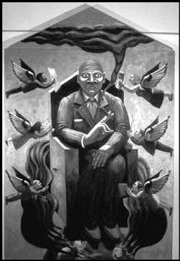THE CULTURAL DIVIDE that separates a cheerful Disney parade from the concert of a major symphony orchestra is about equivalent, geographically, to the 3081 miles that lie between Orlando and Seattle. So how unlikely would it be for a musician performing in comic sideshows at Disney World in 1996 to become, just four years later, a principal with the Seattle Symphony?
“I consider myself very lucky,” says Chris Olka, 29, a man who made just such a journey, and who, as the SSO’s new tuba player, made his first appearance in a full-time role last Saturday night. Hired by Gerard Schwarz at the start of the 1999-2000 season in an interim position (after Michael Russell suddenly announced his retirement), Olka later won the grueling audition for the permanent spot. The great warmth of his playing—a sound that the SSO’s bass trombonist, Steve Fissel, calls “encompassing”—has strengthened the orchestra’s foundation and helped turn its brass section into a persuasive force. In the opera pit this summer, Olka belted out solo after solo, rattling pocket change in the back row and leading one local Wagner fan to call him the best thing to happen to The Ring in years.
If there’s any luck to Olka’s arrival in Seattle, it came 15 years ago, when he was still a saxophonist and a freshman in a Florida high school—the year all the tuba players were seniors and were graduating. The band director, needing replacements, was blunt. “He said to me, ‘You’re a big guy,'” recalls Olka, who, with his gymgoer’s build and short, neatly cut hair, could pass for a sergeant in the Army Reserve. “‘You want to play in the band, you have to play tuba.'”
Olka, eager to stick with music, switched instruments. And right out of high school he was hired by nearby Disney World, where he stayed for seven years, performing in German bands, parades, and a tuba quartet that required him to dress up as a 1930s newsboy. Still only in his 20s, he nevertheless assumed it was the end of the line and figured he’d probably become a band director. But by his last year, he’d grown tired of sousaphones, costumes, and rowdy tourists. “Inevitably they’d throw stuff into the horn,” Olka says, “like wadded-up paper cups, pennies, trash, whatever.” So Olka, humble and easygoing but possessing a strong resolve, decided to get serious. He was accepted into the prestigious Juilliard School of Music, lost a hundred pounds (he’d edged over 300, making it difficult to breathe when playing seated), and spent just about every available hour with his horn, a regimen that would lead to his discovery by Schwarz.
For any professional musician, of course, a devotion to practicing is essential, and Olka’s efforts are no different—except, that is, when you consider the trouble he’s encountered in Seattle simply finding a place to play. The sound of the tuba, as one might guess, is difficult to muffle. Unwilling to disturb neighbors, Olka started using the backstage area of Benaroya Hall—not knowing that its ceiling, unfortunately, forms the floor of the smaller hall above. “I found this out after apparently ruining a couple of guitar recitals up there,” Olka says sheepishly. Other areas in the building didn’t work so well, either. Excerpts from the “Ride of the Walkre” soared up elevator shafts and air ducts. “They were hearing tuba all day long,” Olka says, shaking his head, “going into donor luncheons and board meetings.”
He tried the outdoors, first the beach at Madison Park near his apartment, which worked just fine for a while until the cops, responding to complaints, showed up to warn him that he was violating the city’s noise ordinance. In the Arboretum, where, Olka believed, “surely to God no one could hear me,” two cruisers chased him off. Finally, he fled to a wooded glen between SR 520 and an on-ramp—only to discover later that he’d been serenading a rather well-known meeting place for men.
Even without such burdens (can some wealthy patron donate him a farm?), Olka believes he has one of the most difficult positions in the orchestra, given the range required of a single player, on anything from Berlioz to Bruckner. And because the instrument is so resonant, particularly in Benaroya Hall, “each note,” Olka says, “is a solo. If you miss, the audience hears it . . . and there’s not any other instrument in the orchestra that has as big an impact on the way the group sounds.”
The job, too, involves a kind of ongoing ambassadorship. Despite its authority and unmatched richness, the tuba doesn’t often garner a lot of respect. “Many people,” Olka amusedly grumbles, “still think of the tuba player as a dopey, friendless virgin who goes to all-you-can-eat joints all the time.” The instrument itself does, in fact, lack an esteemed lineage, having evolved from an assortment of oddities that include the serpent, the ungainly ophicleide, and a 10-foot-tall contraption called the trombontonar. And the sheer size of the modern version can make it look, onstage, like a bodybuilder who’s stumbled into a formal party. So Olka, ever mindful of the stereotypes, makes sure to heed the advice he gives his students: “Have some dignity when you’re in public, and people are going to take you seriously.”
For a man who once had a football thrown into his horn at a Disney party, being taken seriously is just about all he asks for—well, that and a place to practice.







